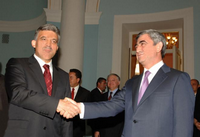ISTANBUL, Turkey -- Yesterday's signing of protocols by Turkey and Armenia that pave the way for restoring relations between the two countries was, without a doubt, a historic moment. But it's still too early to break out the champagne.
The protocols -- signed in Zurich in the presence of the American, French and Russian foreign ministers -- spell out in the clearest terms to date what needs to happen in order for diplomatic ties to be restored and for the two countries' borders to be reopened. But significant hurdles, some of which involve actors outside of Turkey and Armenia themselves, still stand in the way of that actually happening.
Ankara and Yerevan broke off relations in 1993, when Turkey closed its border with Armenia. The move followed Armenia's invasion of the Azerbaijani territory of Nagorno-Karabakh, but the animosity between the two countries goes backs decades further, to what Armenia alleges was the genocide of an estimated 1.5 million Armenians under the Ottoman Turks during World War I.

